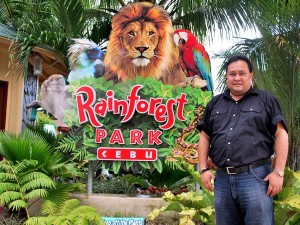Eco-tourism park rises in Cebu

ECO-TOURISM PARK. Butch Guillen, owner of the Rainforest Park in Cebu, poses in front of the park’s signage. JAY ROMMEL LABRA/CDN
CEBU CITY – Butch Guillen wanted to put up a business that would help promote environmental awareness. So he and his family decided to set up an eco-tourism theme park within the city.
The P15-million Rainforest Park Cebu, which opened last August, provides an alternative tourist attraction, offering adventure-filled activities that have caught the attention of many clients, including employees of business process outsourcing companies (BPOs) and their families.
“I was thinking that we need to exert efforts wholeheartedly to promote environmental awareness while doing business,” Guillen says.
He wanted an enterprise that would encourage the preservation of trees, marine resources and birds, as well as one that would conserve water, he explained.
Guillen is a long-time real estate sales and marketing man.
He presented his theme park idea to members of his family, including his wife, Anne Mitus, who is engaged in the restaurant business.
Similar rainforest cafés in cities like Las Vegas and Chicago in the United States inspired him to conceptualize a facility that would offer an earthy ambience and outdoor activities in the heart of the city.
For car-less Cebuanos
“We planned to have this not far from the city center since the nearest mountain adventure spot is 33 kilometers away, in Barangay (village) Busay,” he says. “This is for the ordinary Cebuano who doesn’t have a car. We made it a point [for it] to [be] accessible from the main thoroughfares.”
The 2,000-square-meter park along the Ayala access road has an outdoor obstacle course amid lush greenery, a zip line, and wall climbing and assisted tightrope walking facilities.
Other obstacles are the Cargo Net, which simulates root climbing using cords, and Earthquake, which requires users to walk on wooden planks suspended from a metal beam high above the ground.
Open daily from 10 a.m. to midnight, Rainforest Park Cebu caters to what Guillen calls the Cebuanos’ hunger for eco-tourism adventure.
“We really want to promote the environment,” he says.
Environment lessons
Signs posted in strategic spots teach visitors lessons about the environment.
“Trees muffle urban noise almost as effectively as stone walls do,” one sign reads. “It can abate noise from freeways and airports.”
Guillen says he sees the park’s ecological education efforts as a “legacy to leave to generations to come.”
Rainforest Park Cebu also features a restaurant with a bird sanctuary and an oceanarium that accommodates various marine species.
Its management plans to keep local and other Asian birds in the aviary. They will also bring in monkeys, crocodiles, lizards and other animals since they plan to “expand and put up a small zoo,” Guillen says.
The theme park also cares for animals under the Adopt-a-Wildlife program of the Department of Environment and Natural Resources.
Some of the 50 park workers take care of the trees, shrubs and other vegetation using rainwater collected in a 5,000-gallon underground catchment.
Challenges
Guillen says the main challenge is earning “the acceptance of the public, since the park is the first of its kind in the city.”
Another was that of raising funds, “since we solely relied on our meager resources,” he adds.
They are not expecting any return on investment until the fifth year of operations. But they were overwhelmed by the response of the Cebuanos, including BPO workers, who keep the place fully booked for days on end.
A group of 200 call center agents once booked the place for a weekend for team-building activities.
Family celebrations like birthdays are also accommodated. Children can use the air-conditioned tents.
Guillen is assisted by his wife, who loves to cook.
Their daughter, Marion Tara, described the park as a “one-stop shop” because of its amenities.
Aside from a jungle adventure site, it is home to the Zoofari Café, Oasis Spa and Salon, Rainforest Gift Shop and Tribes’ Bar.